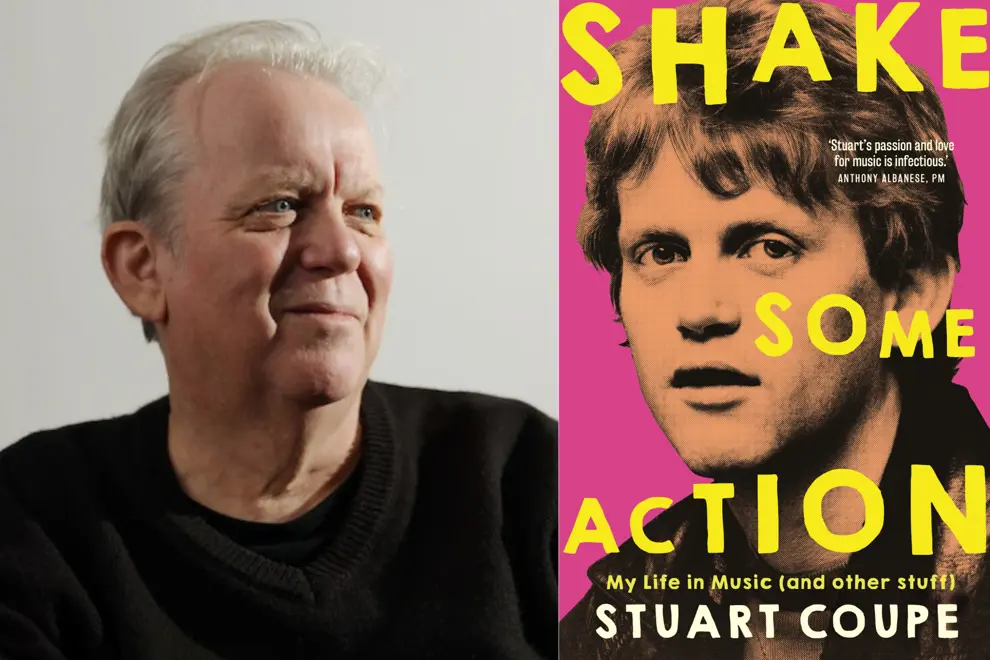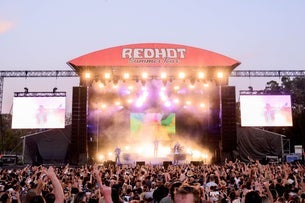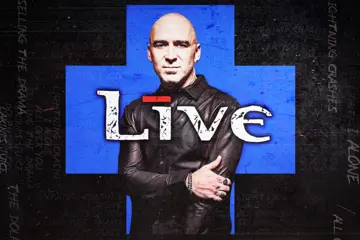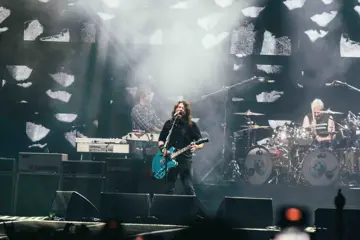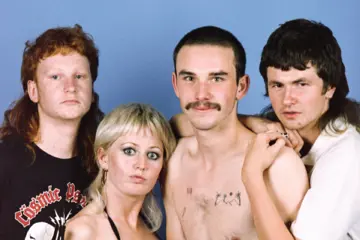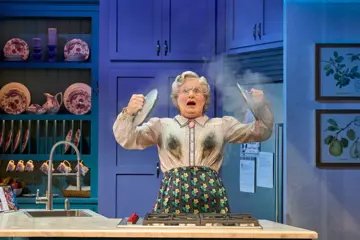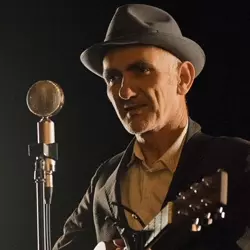 Paul Kelly
Paul KellyIt’s very rare for a music book to get endorsed by a sitting prime minister. Not even by Paul Keating, who in the 1960s briefly managed a band called Ramrods.
But Anthony Albanese did it for Stuart Coupe’s new memoir Shake Some Action, stating among other things that his “passion and love for quality music is infectious.”
It’s not just a spin either. Years back when they met at a gig, the first thing Albanese said to him was, “I grew up reading your music writing.”
Coupe, a staunch ALP follower with leftwing attitudes, admits, “That was….pretty…cool.”
DJ Albo attended his 60th birthday book and Shake Some Action has a photo of them hanging out at Bluesfest.
“His music taste, from what I can tell from the playlists when he DJs was pretty good. Did we ever think we’ ever have a prime minister who owned and wore Celibate Rifles and Radio Birdman T-shirts?
“This is not a mental picture I have of Tony Abbott or Scott Morrison.”
Pilots Or Community Radio
A few years ago, Coupe caught up with Penguin Random House publishing director Justin Ractcliffe over an early morning coffee to pitch his 15th book. The lives of airline pilots? The history of community radio?
Ractcliffe was non-committal. He was more interested in a Coupe memoir. Coupe wasn’t interested. At the age of 66, he felt he had more books in him before a career retrospective.
Over the years, Ractcliffe swung him over.
He wasn’t so much interested in Coupe’s many on-the-road war stories.
Don't miss a beat with our FREE daily newsletter
His focus was the story of a teenager growing up in Launceston – just scraped through high school, not great at spelling and a one-finger typist – who achieved his dream of becoming as famous as the music journos he idolised, like Lester Bangs, Dave Marsh and Nick Kent.
He was also drawn to how Coupe kept so many balls in the air.
He was a music critic for a wide range of titles, presented radio shows, set up Laughing Outlaw Records, managed Paul Kelly and Hoodoo Gurus, did publicity for The Clash, The Cramps and Gary Glitter, toured his cult music and literary heroes, got into crime fiction, founded Mean Streets magazine and co-founded the Ned Kelly Awards and wrote tomes on Paul Kelly, Tex Perkins, and industry folks as roadies, promoters and Michael Gudinski.
Coupe’s rise was rapid. The first chapter of Shake Some Action is his first “pinch me, I’m dreaming” moment. It was in Paris, April 1981, at 3am backstage with Bruce Springsteen after a sell-out to 5,000 at the Palais des Sports.
CBS Records had flown journos from around the world to catch Springsteen, who was still some years from becoming a superstar with Born In The USA but nevertheless a revered contender.
Stuart had been obsessing over Springsteen since 1973 via an imported copy of his first album, and spreading the word in Australia.
“Before that there were moments like going on tour with Graham Parker and being in the lift with KISS in Adelaide without their makeup on. But Paris was the gobsmacking moment.
“I was 25, first time outside Australia. Not only backstage with Springsteen but standing next to Dave Marsh at a nightclub the night before.”
Insights
The 50 chapters in Shake Some Action provide some insights into the music industry, delivered mostly with bemused humour.
They included the launch in Sydney of his book The Promoters, which took place just after Michael Chugg and Michael Gudinski acrimoniously dissolved their partnership. When an enraged Gudinski heard that Coupe had asked Chugg to address the launch, he invited himself to also speak. The two spent most of the evening yelling at each other.
At the end of a sell-out show by an act Coupe managed, the venue owner motioned him over and thrust him a paper bag filled with $18,000.
That was Coupe’s unexpected cut of the ticket money that wasn’t being declared to the tax office. The venue’s share was presumably more.
A memorable article, widely syndicated around the world, was a confrontational encounter with Bob Dylan. Initially he had been flown to Auckland by Gudinski to review the show and create a buzz for the following Australian dates.
But suddenly Gudinski flung it on him he was to do a rare interview His Bobness as well. Having already “snorted half of Bolivia”, Coupe had to wait a few hours while the singer rang his children back in America. The nerves took over.
“It was in no way a comfortable experience. Dylan didn’t want to do this interview, nor did his manager Elliot Roberts. But Michael felt they weren’t selling enough tickets, although the tour was hardly a disaster, and they were doing it to appease him.
“It didn’t help I was high as a kite. I also let him know early in the piece that I was down with what he did, and asked him about (US counter culture figures as comedian) Lenny Bruce and (poet) Allan Ginsberg.
“It was the worst way to tackle Dylan. I found out later he has a disdain for obsessive fans and I came across as one. He was confrontational like he was in (1967 doco-movie) Don’t Look Back.”
Dylan loathed the resulting story, particularly where Coupe described his handshake as weak and clammy, and mentioned his ringing up his family after each show (“don’t know why he was annoyed, I thought it was a touching and human thing to do”).
A two-part confrontation in the pages of RAM with Steve Kilbey short-fused the Church songwriter so much that he blanked Coupe for 30 years.
One peeve was being quoted as saying he was “the greatest songwriter that ever lived.”
Another was the comment that The Church only got on Countdown because Molly Meldrum fancied him. Meldrum was furious and would have won if he’d sued for defamation, and EMI Records threatened to pull out ads from RAM.
Coupe recalls: “What upset Steve was that because we talked for so long, until the sun came up on St. Kilda beach, I’d run out of cassettes, I was recalling the conversation from memory. He suggested he hadn’t said those things and I went ‘Well you did!’”
Touring For Love
Shake Some Action relates the perils of touring overseas acts simply because you loved their records. Successful promoter Michael Coppel would later warn him off, as he himself had started his career that way.
“Michael told me that he realised quite quickly it was cheaper to buy a first class air ticket to whatever country they were in, hiring a limousine and seeing them five or six times.”
Coupe learned the hard way that bringing out the likes of Harry Dean Stanton, Lucinda Williams and Guy Clark – some of whom lived on another planet – allowed him to become friends with them but were financial disasters.
The Stanton tour began with a great deal of hype and excitement, but fell apart instantly after a single review in the Sydney Morning Herald by Bruce Elder that Stanton may have been a good actor but was just an average musician.
“We don't live in those days,” Coupe opines about that era when a single review could torpedo a tour or record release. “People have so many other ways to get their opinions and information and I don’t think journalists wield the same power as they did then.
“In those days, the Sydney Morning Herald and The Age were one block, and Juke, RAM and Rolling Stone were another. They commanded enormous readership, influence and gravitas.
“People knew the tastes of their star writers and would buy accordingly because their opinions really mattered. Record stores would say an album review by Bruce Elder would see an increase of 300 sales the next weekend.
“These days music fans have so many other ways to get their opinions and information. I don’t think a review can change things as much although there are exceptions of course. Many of the newspapers are behind paywalls and don’t have that same impact.
“We were a different breed then, with more freedom to write and be part of the story, more outlets to write for, much less in the pockets of record companies and publicity people.
“We had more access to people, it wasn’t always done on the phone or zoom. We’d hang out. There were no phone cameras then and they were less guarded.
“I think we wrote with a different attitude. Music journalism to me feels different, the writers seem less immersed in what they’re writing about. Maybe there’s less engagement and passion.”
Shake Some Action, My Life In Music (And Other Stuff) by Stuart Coupe is released through Penguin Books on August 8, RRP $35.

